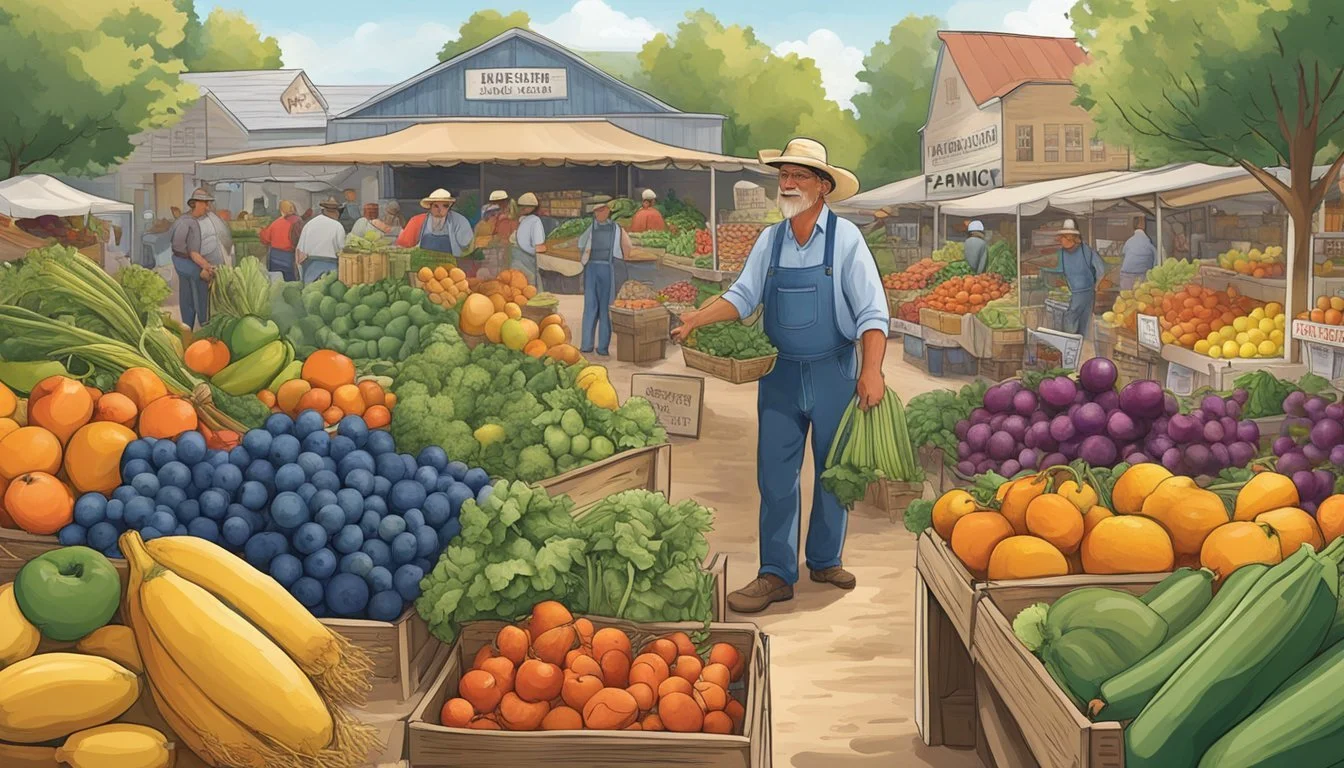Guide to Farming in North Carolina
Essential Tips for Successful Agriculture
This Article is Part of Our State by State Farming Guide
North Carolina's landscape is rich and varied, with a heritage deeply rooted in agriculture. Across the state, from the coastal plains to the rolling hills of the Piedmont and the mountainous western region, farming is integral to both the culture and the economy. Agriculture is the state's number one industry, generating billions of dollars annually and providing a livelihood for countless communities. The state's favorable climate and fertile soil allow for a diversity of crops and farming practices, ensuring that North Carolina remains a leader in agricultural production within the United States.
Support and resources for new and established farmers are plentiful in North Carolina. Extensions of NC State University, such as the NC State Extension, play a crucial role in reaching out to millions of citizens each year, disseminating research-based knowledge and innovative farming practices. Beginning farmers can also find incubator programs and comprehensive guides that assist in the development and operation of successful farming enterprises. North Carolina's agricultural resource guides serve as vital assets, offering support to socially disadvantaged farmers and helping to sustain farm operations across the state.
Farming in North Carolina encapsulates a blend of tradition and innovation. This is evident from the state's prolific production of staple crops such as sweet potatoes (What wine goes well with sweet potatoes?), corn, wheat, vegetables, and soybeans, as well as specialty crops like blueberries, strawberries, and cucumbers. Agriculture in North Carolina is more than just an economic driver; it is a testament to the resilience and enterprising spirit of its farmers and the communities that support them. As the industry evolves, the state continues to provide valuable resources and infrastructure to ensure that its farming culture thrives alongside the ever-changing demands of agribusiness.
Fundamentals of North Carolina Agriculture
North Carolina's agriculture is a cornerstone of its economy, with a diverse range of commodities that thrive due to its rich soils and favorable climate. This guide explores the essential aspects of the region's agricultural framework.
Overview of North Carolina Agriculture
North Carolina boasts a robust agriculture industry, with more than 8.4 million acres engaged in a range of farming activities. The state is renowned nationally for its production of sweet potatoes (What wine goes well with sweet potatoes?) and tobacco.
Climatic and Geographic Conditions
The climate in North Carolina is classified as subtropical, with abundant rainfall, mild winters, and well-distributed precipitation that benefits various crops. Geographically, the state's rich soils and plentiful water resources create optimal conditions for agriculture.
Key Agricultural Commodities
Tobacco: Leading commodity in national production.
Sweet Potatoes: Highest production volume in the U.S.
Additional major commodities include poultry, soybeans, corn, cotton, and grains.
Importance of Agriculture to the Economy
Agriculture is a principal driver of North Carolina's economy, contributing $91.8 billion annually. It also plays a significant role in employment, supporting 17% of the state's jobs.
Regulatory Landscape and Government Support
The North Carolina Department of Agriculture & Consumer Services (NCDA&CS) governs the agricultural regulations, ensuring sustainable practice and growth. The Agriculture Commissioner actively champions for farmer support.
Educational Resources and Programs
North Carolina provides various educational platforms and programs for agriculture such as workshops and agricultural education. NC State University Extension is a key resource for research and learning in the agribusiness sector.
Agricultural Practices and Management
Effective agricultural practices and management are crucial for producing high-quality yields, ensuring food safety, and maintaining environmental health. North Carolina's farming community actively implements innovative strategies across various domains to meet these objectives.
Soil Preparation and Crop Rotation
Farmers in North Carolina recognize the importance of soil preparation and crop rotation. Properly prepared soil and the strategic rotation of crops, including cover crops, prevent erosion, maintain soil health, and reduce pest problems. For example, rotating a legume crop that enriches soil with nitrogen followed by a nitrogen-consuming crop is a common practice.
Irrigation and Water Management
Irrigation and water management are key to North Carolina's agricultural success, given the state's variable climate. Efficient water use strategies, such as drip irrigation, conserve water while ensuring crops receive the necessary hydration. This optimized use of water not only aids in crop growth but also supports environmental conservation.
Pest and Weed Control
Integrated Pest Management (IPM) strategies, with an emphasis on minimizing chemical use, play a significant role in North Carolina's pest and weed control. Farmers use a combination of biological control agents, physical barriers, and, when necessary, targeted chemical applications to manage pests and weeds effectively.
Sustainable Farming and Organic Practices
Sustainability and organic farming are at the forefront of North Carolina's agricultural ethos. Through the use of sustainable practices such as reduced tillage and green waste composting, farmers aim to reduce their environmental impact. Organic practices are also increasingly adopted, reflecting consumer demand for organically grown produce.
Livestock Rearing and Animal Welfare
Livestock rearing in North Carolina includes the implementation of robust animal welfare standards. Best management practices ensure the health of livestock through adequate nutrition, veterinary care, and comfortable living conditions. This leads to the production of safe and high-quality animal products.
Food Safety and Quality Assurance
To guarantee food safety and quality, North Carolina farms adhere to Good Agricultural Practices (GAPs). These include measures to prevent microbial contamination and protocols for traceability. Such standards are vital for protecting consumer health and maintaining trust in North Carolina's agricultural products.
Challenges and Risks in Agriculture
Farming in North Carolina faces an array of diverse challenges and risks, from environmental stresses to economic volatility. Understanding these hurdles is crucial for the sustainability and progress of the agricultural community.
Environmental Concerns and Conservation
Agricultural practices exert significant pressure on North Carolina's environments. Farmers must contend with soil erosion, nutrient depletion, and habitat destruction. Conservation efforts are essential to maintain the ecological balance and long-term productivity of farmlands. Implementing strategies such as crop rotation, cover cropping, and buffer zones can mitigate negative impacts on the environment.
Economic and Market Uncertainties
Farmers in North Carolina navigate through economic uncertainties including fluctuating market prices and high operational costs. Dependence on a limited number of cash crops can exacerbate this volatility. Diversification and exploring niche markets are strategies that can offer some stability to farm incomes.
Climatic Risks and Water Scarcity
Climate change poses significant threats to agriculture, with increased incidence of extreme weather events. Drought conditions can lead to water scarcity, hindering crop production. Efficient water management techniques, such as drip irrigation and rainwater harvesting, are critical in ensuring water availability.
Pest and Disease Outbreaks
Crop health is at constant risk due to pests and diseases, which can devastate yields. Effective pest management and disease control protocols are essential for protecting crops. Integrated Pest Management (IPM) strategies aim to minimize chemical use while controlling pest populations.
Regulatory Compliance and Legal Issues
Compliance with environmental regulations and consumer protection laws presents a challenge for North Carolina farmers. They need to stay informed about various (local, state, and federal) regulations affecting agribusiness to avoid potential liability. It's important for them to work with legal advisors to navigate these complexities.
Marketing and Sales of Agricultural Products
North Carolina's agricultural sector thrives on effective marketing and sales strategies that cater to both local and international markets. Understanding how to navigate these channels is crucial for the prosperity of agribusiness and the wider economy.
Understanding the Market Dynamics
The agricultural market in North Carolina is dynamic, with an ongoing need to analyze trends and consumer demands. Producers must continuously track farm market prices for commodities, as these prices can fluctuate based on various factors such as weather, production levels, and market demand. Knowledge of these market dynamics is essential for farmers to achieve optimal pricing for their products.
Building Brand and Consumer Trust
In North Carolina, trust and brand development are paramount for agribusiness growth. The Marketing Division promotes North Carolina agricultural products and aims to build strong brands through the administration of the Farm Products Marketing and Branding Law. This enhances consumer protection and fosters loyalty by ensuring quality and traceability from farm to table.
Exploring Local and Export Markets
Local farmers markets play a significant role in the marketing of North Carolina's agricultural products, allowing consumers to access fresh local food directly. Aside from local markets, export opportunities are explored to distribute products internationally, increasing the state's agricultural footprint and contributing substantially to the economy.
Role of Marketing Associations and Cooperatives
Agricultural associations and cooperatives are crucial in streamlining marketing efforts for North Carolina's farmers. They develop and expand markets, provide valuable resources for farmers to promote their products, and represent collective interests that can lead to better negotiation power in the market, both locally and internationally. These entities are instrumental in uniting individual efforts for greater impact in the agriculture industry.
Agriculture's Role in North Carolina's Culture
Agriculture in North Carolina is more than a mere economic activity; it is an integral part of the state's culture. This rich tradition has shaped the local communities and lifestyles since the establishment of early settlements. Plentiful farmlands define much of the state's landscape, influencing local customs, food preferences, and social events.
Local Food and Traditions
Communities across North Carolina place high value on local food. Farmers' markets and agricultural fairs are cultural hubs where residents celebrate the state's farming heritage. These events serve as a nexus for cultural exchange, showcasing local produce and traditional Southern cooking methods.
Festivals: Seasonal festivals honor specific crops, such as the North Carolina Apple Festival, testifying to the cultural significance of agriculture.
Cuisine: Local cuisine is deeply connected to agriculture, with iconic dishes featuring sweet potatoes, pork, and collard greens (how long do collard greens last?)—all staple products of North Carolina farms.
Educational Impact
Agriculture's influence extends to education, with institutions like NC State Extension providing resources and knowledge to the community. They support cultural continuity by teaching farming techniques and the importance of sustaining local food systems.
Food Narratives
North Carolina's history is rich with food narratives that intertwine with the state's identity. Stories of tobacco farming or the more recent expansion into specialty crops such as peanuts articulate a culture that respects and evolves with its agricultural foundations.
In sum, agriculture shapes the tapestry of North Carolina's culture, embedding itself in the day-to-day lives and traditions of its people.
Innovations and Future of Agriculture
North Carolina is a state where technological advancements and strategic initiatives play pivotal roles in shaping the future of its agriculture industry.
Technological Advancements in Agriculture
The agricultural sector in North Carolina is experiencing a significant transformation through technological innovation. Farmers are adopting precision agriculture tools that utilize sensors and satellite imagery to optimize crop health and yield. Technologies such as drones assist in monitoring crops and managing farm resources more effectively, signaling a leap towards increased sustainability and growth.
Government and Private Sector Initiatives
The government and private sector are fostering agribusiness development through research and innovation. Initiatives by NC State Extension are prime examples where research is converted into practical solutions, positioning farmers to capitalize on new opportunities. Investment in Agricultural Planning and Conservation Programs further supports the industry's sustainability, with resources made available at websites like http://www.farmlandinfo.org.
Agriculture and Community Development
Agriculture in North Carolina is more than a source of food; it's a vehicle for community development and agritourism. Farms are integrating practices which transform them into destinations, thereby aligning agricultural progression with community engagement. This also reflects an increasing intersection between farming, leadership, and the cultivation of community-oriented experiences.
Resources and Networking Opportunities
In North Carolina, farmers are supported through a network of resources and opportunities that promote sustainable agriculture and enhance market competitiveness. This includes a range of professional associations, agricultural extension services, and avenues for financial assistance.
Professional Associations and Events
Associations:
Carolina Farm Stewardship Association (CFSA): Advocates for fair farm and food policies and provides systems to aid family farms.
NC FarmLink: Facilitates relationships between farmers, landowners, and service providers, aiding in land access and transition.
Events:
Annual Conferences: Gatherings like the CFSA's Annual Sustainable Agriculture Conference offer networking and learning opportunities.
Training Workshops: These events provide farmers with technical know-how and industry updates for improved farm management.
Agricultural Extension Services
NC State Extension:
Offers a comprehensive Grower Resource List and Local Food Portal.
Provides Farm Planning and Recordkeeping tools to optimize farm operations.
Hosts the NC Farm School for business and farming education.
NCDA&CS:
Delivers On-line Agronomic Reports to assist with soil management.
NC Farm Safety Resources aim to reduce risks on the farm and promote health.
Access to Financial Services and Grants
Grants:
Funding opportunities are available, such as the Organic Cost Share Program which has escalating funding up to $4 million/year.
Financial Services:
Various agencies offer financial support and services tailored to the agricultural sector.
Casey & Company Realty, LLC is an example of a realty service focusing on farm property transactions.
Assistance through professional networks, extension services, and financial pathways are key for farmers in North Carolina. These structures provide the bedrock for successful and sustainable farming in the region.
Conclusion
North Carolina's agriculture industry is a cornerstone of its economic framework, contributing significantly to the state and local communities. Agriculture is the state's number one business, generating approximately $92.7 billion annually. As leaders in the production of sweet potatoes, eggs, poultry, and other commodities, farmers in North Carolina are central to feeding the state's families and supporting its economy.
Engaging in farming in North Carolina means participating in a future-oriented enterprise. The community stands to benefit from continued agricultural growth due to the state's focus on innovation and sustained investment in research and extension, particularly within key sectors such as blueberries, peanuts, and more. This commitment is evident in NC State's contribution, creating an impressive annual impact of $1.6 billion from just four key crops.
With around 47,000 farms, North Carolina fosters a dynamic agricultural environment. Each farm, regardless of size, contributes to a resilient food system. Challenges such as climate, pests, and market fluctuations are addressed through a collaborative effort by the community and industry experts.
As North Carolina looks ahead, it foresees an agriculture industry that remains adaptable and robust, poised for continued growth and success. These prospects are grounded in the fertile soils and ample water resources that have always underpinned the state's agricultural might. The future for farming in North Carolina is one of confident progress with a firm foundation of community support and economic vitality.





